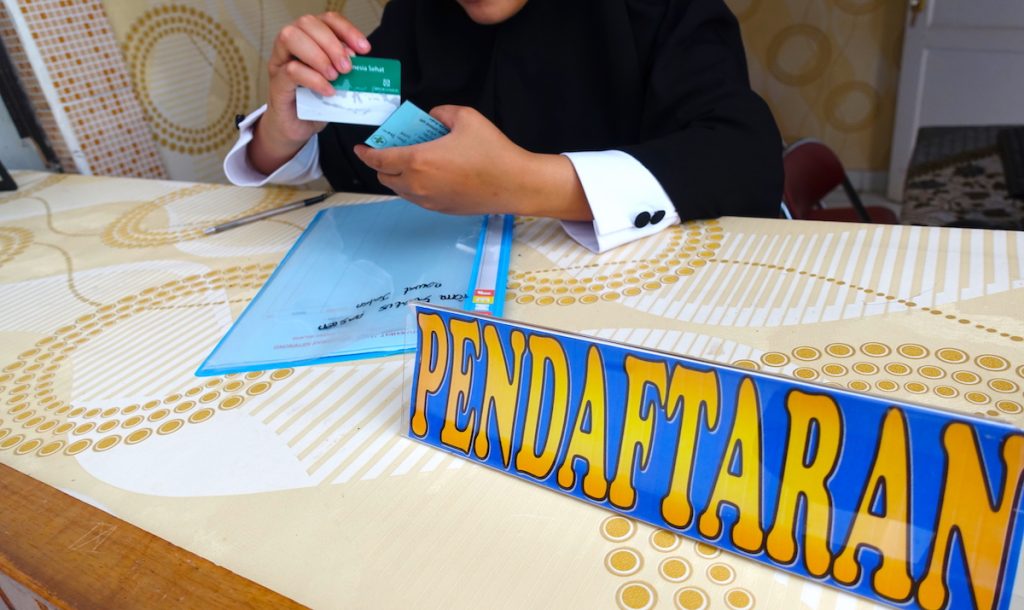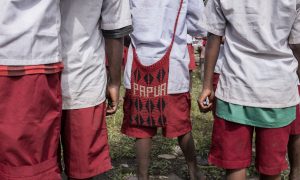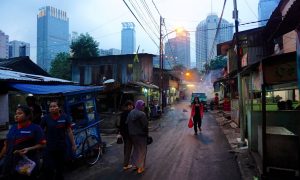I first met Tama* in a remote part of northern Bengkulu province in central Sumatra. For a three-year-old Tama was chronically underweight: at 6kg, he weighed the same as a 6-month-old infant, and still could not walk. From early on, his parents Yono* (30) and Wati* (22) knew that Tama’s cries meant he was struggling to breathe and he would slowly turn blue. Nobody told them what any of this meant until the day Rini,* a newly-arrived and energetic young staff member from the local community health centre (Puskesmas), examined Tama during a check-up at the monthly mobile clinic session (Posyandu).
Concerned by what she found, Rini went to considerable lengths to confirm Tama’s eligibility for assistance in paying his premiums for Indonesia’s national health insurance scheme (Jaminan Kesehatan Nasional/JKN). Thanks to her efforts, Tama’s parents were encouraged to rent a car and travel the three hours from his remote village to the nearest regional hospital in the capital city of Bengkulu. There, Tama was diagnosed with a severe congenital heart disease called Tetralogy of Fallot with pulmonary atresia, which fortunately can be corrected with a surgical procedure. While Tama’s parents still had to cover their own flights and accommodation to travel to Jakarta for the operation, they did not have to pay a single Rupiah for the procedure.
Indonesia’s universal health coverage program, Jaminan Kesehatan Nasional (JKN, or National Health Insurance), is helping poor families like Tama’s weather the shocks that come with medical emergencies. This absence of a financial barrier to healthcare is crucial for Tama’s family, who depend on Yono’s weekly earnings of Rp200,000 (A$20) as a rubber plantation labourer. Because of their low income, they are among the more than 96 million Indonesians who are currently beneficiaries of the PBI (Penerima Bantuan Iuran, or Premiums Assistance Recipient) scheme. As PBI recipients, their JKN insurance premiums are covered by the state budget.
But not every Indonesian is willing to contribute to the national health coverage system. I asked one of my colleagues, Sylvia,* a healthy and productive young professional based in Jakarta, about her experiences. An early adopter of this social health insurance program, participating since January 2014, she let her monthly Rp80,000 (A$8) membership lapse when she left Indonesia for postgraduate study abroad three years ago. She says, “I agree with the value …of gotong royong (mutual cooperation)…and I do feel I’m wrong by not re-joining [JKN]. But I don’t think I need it right now. I have private health care insurance from my work place. They suggest that I register again as a self-paying member of JKN and they will provide the premium payment, but it’s a hassle to have to go myself to the BPJS-Kesehatan [the agency which runs the JKN fund] office.”
Despite her inactive membership status within the JKN system, Sylvia has accumulated two years of overdue monthly payments. Her debt forms part of the nearly 40% of all JKN non-state contributions that remain uncollected, according to remarks by the President Director of BPJS Kesehatan, Prof. Fachmi Idris at a public forum in January 2019. There is no mechanism in place that compels Sylvia to pay her outstanding debt. But her decision to not pay her JKN contribution is actually a loss for impoverished JKN members like Tama. Sylvia’s contribution could have helped to cover the ballooning cost of JKN paying for the health services used by its participants.
Political leadership is needed in order to compel contributions from Indonesians who can afford to pay health premiums, but who currently aren’t doing so. But in an election year, in a country where trust in the health care system is so low that even national dignitaries seek healthcare overseas, is this viable?
The election, inequality, and health care
Indonesia’s national health care insurance program—JKN—is a remarkable achievement. The scheme is on its way to fulfil the definition of universal health coverage (UHC) as defined by the World Health Organization, which is a system that “ensur[es] that all people have access to needed health services (including prevention, promotion, treatment, rehabilitation and palliation) of sufficient quality to be effective while also ensuring that the use of these services does not expose the user the financial hardship”. The program’s creation had a long and turbulent history, but was eventually implemented on 1 January 2014, in the final stages of President Susilo Bambang Yudhoyono’s term. The launch of JKN was seen as a historical victory in the battle for social protection, with public health activism combining with sustained activism from Indonesia’s labour movement.
JKN is essentially a contribution-based social protection mechanism, where there are people who contribute for their own coverage and people whose contributions are covered by the state. Never before in Indonesia has there been so bold an attempt to reform the healthcare landscape. Globally, it might be the boldest attempt at universal health coverage this decade; JKN’s coverage currently has grown into a membership figure of 217.55 million nationwide. With a plan to cover all of the nearly 267 million Indonesians, it will be the largest UHC scheme in the world.
Besides the headcount, JKN is also ambitious in what it wants to cover. The cost of expensive procedures, such as heart surgeries like the one that Tama will need, or life-long procedures like dialysis for patients with kidney failures, might be expected impoverish households who were not even previously poor. But thanks to JKN’s “no-cap, no-co-payment” rule for its benefit package, patients will face no charge at all for these and most other procedures, provided they follow the referral system put in place.
Meanwhile, JKN has been shown to moderately reduce inequality in access to health care. A 2017 analysis by the National Team for The Acceleration of Poverty Reduction (TNP2K) [see disclosure below] showed the poor have accessed health care facilities more since JKN was implemented. More people from lower socio-economic groups can now access private clinics, which previously were more frequently visited by more affluent socio-economic groups. However, this equalising effect is still limited to access of primary health care facilities. It is a different story with specialised care, which wealthier population groups are still more likely to access.
Paying the bills
There is one big problem, though: JKN is spending money it doesn’t have. The scheme’s achievement in reducing the health inequality gap is marred by the fact that the fund is continually in deficit, because it pays out more to cover the cost of participants’ treatment than it receives in contributions. The Jokowi administration has reluctantly been bailing out JKN. A new ministerial decree places caps on procedures and introduces co-payments for hospital-level care, presumably to curb the growth of future deficits. Although PBI members like Tama will not be affected, the consequence of this to existing non-PBI members is yet to be fully understood.
While these problems are not unique to Indonesia (the British NHS is a good example of a strong nation-wide social health insurance program in a constant state of deficit), the issue of the JKN deficit has been a preoccupation for political actors.
Hans Pols proposes a new perspective on the history of colonial medicine from the viewpoint of indigenous physicians.
Breaking the Colonial Hypnosis: Radical Physicians and Medical Nationalism in the Dutch East Indies
Prabowo Subianto, meanwhile, has raised JKN’s problems on the campaign trail. In his “Indonesia Wins” (Indonesia Menang) speech three days before the first presidential debate in mid-January, Prabowo promised a “repair” of BPJS “management” and a promise to doctors of “decent” pay, without going into specifics. Prabowo attempted to court support from healthcare workers with comments like “doctors are being paid less than parking assistants.” The fact that doctors’ welfare receives such an attention is a new phenomenon for presidential campaigns in Indonesia.
But if there is no change in JKN fund income, and a continued hesitance to expand or find new sources of fiscal space for health, any government, be it Jokowi’s or Prabowo’s, will be stuck with JKN’s continual dependency on state funds. In short, the voters are now presented with an incumbent who was seen to be distancing himself from the financing challenges, and an opponent who is blaming the incumbent and selling the dream of an easy solution.
Individual payments: the “missing middle”
So what needs to be done? I believe that the government’s guiding principle should be that Indonesians who can afford contribution to pay their health insurance premiums need to start paying. The two categories of people who need to pay more are employers and individuals. Employers are not paying enough, because they devise low ceilings and do not pay increased premiums. In the case of individuals, the problem is that people are disinterested. Neither Jokowi nor Prabowo are likely to say this on the campaign trail. It’s politically unpopular to argue, essentially, for higher taxation and for wealthier people to pay for the health care of others. But if JKN is going to work, it has to happen now, because the scheme’s image is corroding.
To break its dependency on the state budget, JKN needs to receive payment contributions from individuals who are working, mostly healthy, and relatively well-off. Specifically, payments are needed from formal, salaried workers outside of government’s payroll and from informal, non-salaried workers. When the first Presidential Regulation on JKN was issued in 2013, it had an ambitious but unrealistic dream of making it compulsory for this cohort of people to enrol by 1 January 2019.
Yet among informal workers, who must sign up to JKN on their own rather than have employers do so on their behalf, there is still low self-enrolment. The informal sector dominates Indonesia’s workforce (58.2%, or a total of 73.98 million workers). So with only 31.2 million JKN members from this segment, it means there are an estimated 40 million people missing from JKN enrolment—so many so they have come to be called the “missing middle”. Many of those who have enrolled do not routinely pay their premiums. The enrolees in this group are benefiting the most from the JKN scheme because they are under-contributing and over-using the system, using almost 4 times what they contribute. A quarter of self-enrolled members are also only joining after they get sick. In contrast, the poorest segment of the JKN system—the PBI beneficiaries—only use around 77% of the funds contributed by the state on their behalf.
The challenge of boosting participation from the healthy, working population to pay health premiums is a problem for many countries around the world. One option is to develop better policies that enforce membership compliance through administrative penalties. This measure was initially written into the 2013 Presidential Regulation on Social Health Insurance, signed by President Yudhoyono, but then dropped from Jokowi’s 2016 and 2018 Presidential Regulation revisions. BPJS’ Prof Fachmi Idris has called for a return to this option by making social health insurance membership a pre-condition to obtaining documentation such as driver’s licenses or passports. That option, however, would require coordination with agencies overseeing such documentation.
A second option is to ensure that the quality of healthcare covered by JKN payments is strong enough health care system to incentivise citizens to join. This requires comprehensive governance arrangements to ensure that existing health facilities are regularly scrutinised and improved. This scrutiny relates to the distribution and competence of health workers at all health care levels, the excellence and distribution of diagnostic and therapeutic technology, and the quality of pharmaceutical products stocked. The Jokowi administration has tried to achieve this by formalising the scrutiny into an accreditation process for all health facilities and practitioners seeking to obtain a contract as a JKN provider. However, greater checks and monitoring from the state are still needed. This requires more funds, which can only be freed up if there are fewer other health system expenditures burdening the state.
Employer payments: overcoming industry clout
The JKN system’s creation was a symbolic win for Indonesia’s labour rights movement. It started with public health activists who consolidated their efforts with labour union movements in advocating for better state social protection. Together they created Komite Aksi Jaminan Sosial (KAJS, or Action Committee for Social Security Reform), which was central in a sustained political campaign that prompted Indonesia’s parliament to pass the landmark pieces of legislation that created the social security that exists today, of which JKN is a major part. But the fight by the labour movement cannot stop with the initiation of JKN. The next battle is to ensure industry interests do not get in the way of ensuring business’ proportional contribution to the JKN fund—a critical part of ensuring the sustainability of the system.
For instance, the formal worker segment of JKN consists of workers who are enrolled into the scheme by their employers. The 2011 BPJS Law mandates that employers pay for 80% of their employees’ contributions. But there is an imbalance of power relations within the overseeing body DJSN (National Social Security Council), an advisory body which is involved in the development of social protection policies. APINDO (Asosiasi Pengusaha Indonesia, or The Employers’ Association of Indonesia), the lobby group for industry interests, is also part of DJSN, resulting in internal resistance to increasing JKN formal worker membership contributions.
Formal employees’ contributions are calculated on monthly salaries, currently capped at Rp8 million (A$800), which means that a mid-level employee with a salary of Rp8 million per month will have the same size contribution as an executive who is paid Rp50 million per month. This Rp8 million ceiling is already a revision from the previously low figure of Rp4.725 million; when Jokowi raised the ceiling to its current level in 2016 it generated protests from APINDO. Since then, there have not been any attempts to again revise the salary cap for JKN contributions. The question remains whether the next president will have sufficiently strong bargaining power to overcome employers’ interests.
Finally, at the heart of the debate about business’ role in safeguarding JKN is taxing the powerful cigarette industry. In the face of a rising JKN deficit, in mid-2018 Jokowi announced a decision to increase Indonesia’s cigarette tax in order to channel additional funds to the social health insurance budget. However, Jokowi caved to industrial pressure and called off the policy, marking yet another defeat in the long-standing battle against the tobacco industry. When the government refuses to regulate an industry which worsens the health care needs of its citizens, while on the other hand not able to make those who are healthy and wealthy to pay, the dream of providing an equal opportunity in health for all will remain a dream.
Social health insurance and citizenship
Social protection in health is one of the most important elements of the citizenship rights discourse. The distribution of a nation’s resources in order to fulfil all citizens’ health needs is necessary for social cohesion. If the goal of Indonesia’s unity and sovereignty is to provide social justice and welfare to all its citizens, then the next presidential election should be able to put a spotlight on the nation’s social health insurance program, JKN.
The public should not be distracted by the mere issue of the JKN deficit fund when thinking about what to look for in the presidential candidates. Instead, we must understand a contribution-based social health insurance as a potent lens to learn the fundamentally differing ideologies that Indonesians hold about what it means to be a citizen. JKN may convert health care from being mostly a marketable private good into a highly-regulated public good. And like all public goods, we must contribute payment for a benefit which we might not immediately receive—and gracefully accept when other people receive the benefits more readily than ourselves.
Unfortunately, Indonesians’ stated affinity for the social value of gotong royong, or mutual cooperation, seems to be undercut by our lack of enthusiasm in participating in JKN, or a lack of action in pushing for political decisions aimed at enforcing a level of contribution proportional to our actual ability to pay. Our choice of leadership should be a reflection of how we think about this as a nation. So it would be nice, for once, if a presidential candidate had the guts to bring this to the foreground.
*Names have been changed to protect the privacy of the informants.
Disclosure: in 2018–19 the author is performing research on primary health care topics for TNP2K on a contract basis. The views expressed here are her own and are not meant to represent those of the Indonesian government or its partners.
 Facebook
Facebook  Twitter
Twitter  Soundcloud
Soundcloud  Youtube
Youtube  Rss
Rss 



